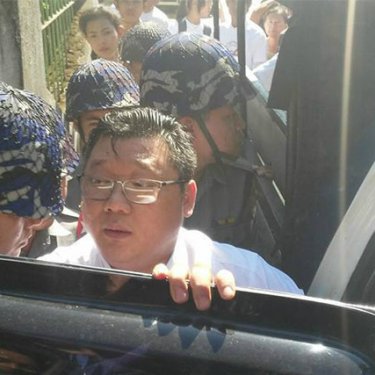Criminal defamation law blocks freedom of information

Reporters Without Borders (RSF) calls on the Burmese authorities to amend the 2013 Telecommunications Law that was used to give Myo Yan Naung Thein, a researcher, a six-month jail term for criticizing the head of Burma’s armed forces on Facebook.
Myo Yan Naung Thein’s trial in Rangoon ended on 7 April with him being convicted of defamation and sentenced under section 66 (d) of the Telecommunications Law, which penalizes “extorting, coercing, restraining wrongfully, defaming, disturbing, causing undue influence or threatening to any person by using any Telecommunications Network.” He was arrested last October after a Facebook post criticizing Gen. Min Aung Hlaing, the commander-in-chief of Burma’s armed forces, over the army’s response to an attack on three border posts in the northern state of Arakan on 9 October 2016 and the ensuing violence that left around 90 dead. Aged 43 and partially paralysed, he was held thereafter in Insein prison despite repeated requests for his release on bail. The authorities finally decided to free him today (12 April). A member of the ruling National League for Democracy and Generation 88 (a group of pro-democracy students who participated in the 1988 protests), Myo Yan Naung Thein was jailed several times under the former military government. He heads Burma Democratic Concern, an NGO that seeks the restoration of full democracy, respect for human rights and the rule of law in Burma, and he writes for its website.
According to the Burmese media, he is the seventh person to be detained on a defamation charge since the civilian government headed (in practice) by Aung San Suu Kyi took office in 2016. A total of 66 people have been charged under article 66 (d) since the law’s adoption in 2013 – 54 of them since the current government took over.
“This conviction is an insult to the freedom of information that Burma regained in 2012,” said Benjamin Ismaïl, the head of RSF’s Asia-Pacific desk. “It highlights the failure of Aung San Suu Kyi’s government to establish a favourable environment for freedom of expression, one in which online activists, bloggers and journalists should no longer have to censor themselves or fear becoming prisoners of conscience. As it stands, the Telecommunications Law is blocking any improvement in freedom of expression and the right to provide news and information, and must be amended without delay.”
Section 66 (d) was used in 2016 against Than Htut Aung, the CEO of the Eleven Media Group, and Wai Phyo, its chief editor. Detained for nearly two months and finally freed on bail of around 70,000 euros in January 2017, they were convicted of defaming Rangoon region chief minister Phyo Min Thein.
Burma has not moved from the bottom quarter of RSF’s World Press Freedom Index, and is ranked 143rd out of 180 countries in the 2016 Index.



